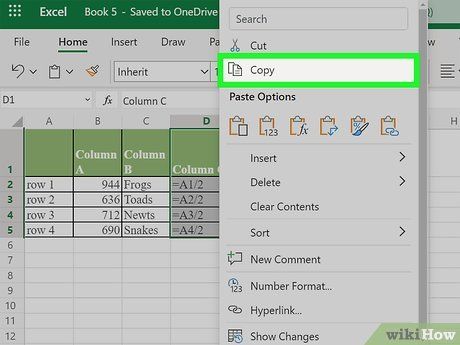5 Ways to Copy Formulas in Excel Sheets Easily

Excel is an indispensable tool for professionals across various industries, especially when it comes to data analysis, financial planning, and project management. One of the most powerful features of Excel is its ability to use formulas for complex calculations. However, understanding how to efficiently copy these formulas can significantly enhance productivity and accuracy in your spreadsheets. In this blog post, we'll explore five easy ways to copy formulas in Excel, ensuring you can leverage this functionality to its full potential.
1. Using Drag Fill Handle

The simplest method to copy a formula is by using the fill handle. Here’s how:
- Select the cell containing the formula you want to copy.
- At the bottom-right corner of the selected cell, you’ll see a small square, the fill handle.
- Click and drag this handle across the cells where you want the formula copied.
- Release the mouse to complete the copy operation.
This method automatically adjusts relative cell references, which means if your formula includes a cell reference like A1, Excel will update this reference in each copied cell to reflect its new position.
Notes:

ℹ️ Note: If your formula contains absolute references (e.g., A1), these references won’t change when using this method.
2. Double-Clicking the Fill Handle

This method is even faster if you want to copy the formula to an entire column:
- Position your cursor over the fill handle of the cell with the formula.
- Double-click the handle. Excel will automatically fill the formula down to the last row of data adjacent to that column.
Double-clicking is particularly useful when working with large datasets, as it can save significant time compared to dragging.
Notes:

⏳ Note: This works only if there are no blank cells in the adjacent columns to indicate the data range.
3. Using Keyboard Shortcuts

For those who prefer keyboard shortcuts, here’s how you can copy formulas without touching the mouse:
- Select the cell with your formula.
- Press Ctrl + C to copy.
- Select the range of cells where you want to copy the formula.
- Press Ctrl + V to paste.
This method gives you the flexibility to choose exactly where to place the formula, preserving its relative references as it adjusts for each cell.
4. Copying Formulas with the Paste Special Command

Paste Special offers more control over how formulas are copied:
- Copy the cell with your formula as above.
- Select the target cells.
- Go to Home > Paste > Paste Special.
- Choose Formulas to copy the formula without formatting, or Values if you want to copy the results only.
This method is perfect when you need to paste formulas while maintaining or changing the format, or when you only need the formula results without the formula itself.
| Paste Option | Description |
|---|---|
| Formulas | Copies the formula but not the formatting or conditional formatting. |
| Values | Pastes only the results of the formula, not the formula itself. |
| Formatting | Pastes only the cell formatting, not the formula. |

5. Using the Fill Across Worksheets

If you need to copy formulas across multiple sheets in an Excel workbook, here’s how:
- Select the sheet with the source formula.
- Hold down the Ctrl key, then click on the tabs of other sheets where you want to apply the formula.
- Ensure the same cell is selected in all sheets, then enter your formula.
- Press Ctrl + Enter to fill the formula across all selected sheets.
This method is incredibly useful for maintaining consistency across different sheets in financial models or dashboards.
In wrapping up our exploration of the different techniques to copy formulas in Excel, it's clear that understanding and applying these methods can greatly streamline your work. From simple drag-and-drop operations to more nuanced control over what gets copied, Excel provides a range of options tailored to different needs. By mastering these techniques, you not only boost your efficiency but also enhance the accuracy of your data manipulation, ensuring that your spreadsheets serve their intended purpose flawlessly.
Why does Excel change my cell references when I copy a formula?

+
Excel changes cell references when copying formulas because, by default, cell references in formulas are relative. This means Excel adjusts them based on the position of the cell where the formula is pasted. If you need fixed references, use absolute references with dollar signs (e.g., A1).
Can I copy a formula without copying its formatting?

+
Yes, using the Paste Special command and selecting “Formulas” allows you to copy only the formula’s calculation part, leaving the formatting behind.
What if I only want to copy the results of a formula?

+
Use the Paste Special feature and select “Values” to copy only the results of a formula, without the formula itself.



